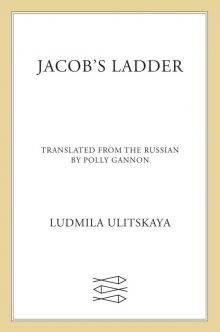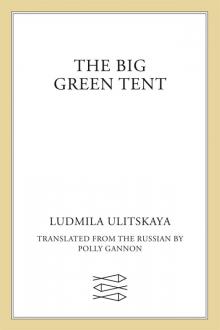- Home
- Ludmila Ulitskaya
Life Stories Page 15
Life Stories Read online
Page 15
"You're trying to make me feel better," Robert said quietly. He was slightly plastered. It had been a week since he had come back from his last trip out, slightly plastered.
"Sure I am," Miguel agreed. He finished his beer. "Sure I am. And you've had enough to drink. We're people, not angels. We're always chowing down on someone."
He stood up, threw three heavy silver coins onto the table. And made for the door, but on the way there, he turned around.
"Robert!"
The captain of the Bad Rap lifted his head.
"It's not just the snark that doesn't have a heart, you know," Miguel smiled. "Neither do people."
Translation by Liv Bliss
The One-Day War
Vladimir Makanin
When a young woman doesn't show up until the very end, somehow, there's no room for her, no need—and so, all the more naturally she appears at the beginning, immediately, here and now. She was a St. Petersburg taxi driver, definitely young, friendly, energetic, but fated to work on that very night. (In general, female taxi drivers are spared from nights. Shifts are rotated.) And her very first passenger sent her straying down unlit and half-lit streets. He was alone, somber, and without a suitcase or any other kind of bag. But it went alright. She let the sulker out and drifted down the deserted streets on the outskirts of St. Petersburg.
Noticing a streetlamp and some well-placed fir trees bravely standing over the road, she slowed down. It was right by the sidewalk, and there was no one in sight. Turning the car off and not forgetting to take the keys (watch out!) the young woman hopped out of her car towards the trees.
The street slept. Just one window was lit in the building across the street. An old man was glued to the glass, intently staring off at nothing. He hadn't been fully asleep when he was woken up. He'd been jerked from that sweet, elderly dream state, when you're half-asleep and you start to believe that, at any moment, your strength will return to you. How he waited for it! These last rays of will are nocturnal, inarticulate, and they slip away; they're yours and not yours. You can't tell whether you're dreaming them. Whether they're a momentary illusion, teasing you.
It was a late night telephone call that woke him up. Of course, he shouldn't have answered the phone so late at night, but he jerked out of bed, hurried his hand towards the receiver, and listened (for the hundred and first time) to a rude voice calmly say, "Oh...It's you...your time is SOON," laugh and hang up.
The old man lingered for some time, holding the phone, listening to the insolent dial tone that spilled from it before putting it back in its charger base. That's what they called it now: "putting it in its base." In his day, they'd used the unpleasant verb "to hang up."
He could go back to bed and perhaps fall into a vivid dream state. Laying down on his right side, he could perhaps find something funny about his soft bed and himself: an old man, putting his phone in its base after a conversation.
But before he did this, taking advantage of his brief nighttime clarity, he went up to the window. The time of the moon! He turned his gaze to the darkened, empty street. He saw a taxi. Suddenly, the car stopped and a female driver stepped out and hid in the trio of firs. She took care of her needs there. The old man didn't see her and didn't guess at what she was doing. He only saw her happy face as she reappeared alongside her car and, raising her eyes, assessed her surroundings. She looked at the building across the street and, naturally, at the window—and at him.
Her gaze lasted a second or two, but the old man was already cheered. She waved at him as if to say, "So there are two of us wide awake, you and I, in this slumbering St. Petersburg night." Perhaps, her wave was also to apologize for the trees and her need—it happens, what can you do? The palm of her hand lit up in the light of the moon, or the street lamp. Petersburg had already started freezing over, though it was autumn. Light was strictly conserved, as was heat, but that single streetlamp was always on near the building where the old man lived.
The taxi drove off, but the old man stayed by his window, heartened by the least bit of human contact. He spent day and night locked in his room. He was under house arrest. The old man, you see, was a former President.
He was not alarmed when something warm pressed at the back of his leg a minute later. He knew that it was the eager face of his companion looking for affection—the sturdy head of his dog. His dog and no one else. Remaining by the window, the old man tousled his dog's ears, to which the dog tersely and joyously replied, "Ouuu-ouuu."
The room's echo returned the dog's "ouuu." As though some other dog was answering from afar, thought the old man, an echo from across the sea. From very far away.
Downstairs, at the lobby entrance to this building, there was a table, chair, a telephone, and the strong male musk of security guards. The night guard was on watch—if anything happened, he'd whistle. Next to him was the door (wide open, naturally) to the lounge where three or four strong and, naturally, armed, young men snored. The ex-President was in no way dangerous from a security standpoint. Even if he were at liberty, there was nowhere for him to go. He was no longer mobile enough to flee.
Essentially, the only person guarding him was that night guard. He was also a geezer, and lonely. He suffered from insomnia, and had asked for the night post in order to give the young men a chance to sleep.
There was a song from his faraway youth, a song of his grandfather's generation, where voices cried out to the heavens: "Leeeet the soldiers sleep..."
And they slept. The security guard's mind wandered, considering this and that, not at all concerned with the ex-President—why should he be watching an old man? At the same time, his nightly show of empathy couldn't be generalized. It was like this in every country! The global pursuit of influential old men (the basis and engine for modern public life) made sense to the guard. That's what the powerful deserved. Everyone gets theirs! Another's misfortune isn't always a source of pleasure, but with these powerful men, it isn't for nothing that their downfall warms our humble hearts. It's entirely because of who they are. We're no ex-Presidents, we're just old men. They don't write about us in the papers. And we're delighted in our insignificance. (The only thing pursuing us is our old people smells. And the smirks, perhaps, of our smart-aleck grandchildren, who think that we already reek of death...) The old man he was keeping guard over got what he deserved. After all, wasn't he human just like everybody else? Didn't he commit his share of little sins on his way to the top?
With this last thought, full of severe justice though not self-reflective (yet), the guard fell into a weak and steady state of nocturnal nirvana. Not sleep, but peace.
The peace of mind of the guard, like the peace of mind of many security guards, rested on two facts: first of all, when he worked he got bread and heat—heat at home. Another was the sedative he took every day. Every evening he'd drink (slowly) from the television... This had to do with the world. Even after the One-Day mass hysteria, we Russians had something left. There were a few SS-series missiles left behind, just, just in case.
The modernized ballistic SS-21, commonly referred to as the SS-series, had a calming effect on just about everyone. It was well-known. As soon as it was launched at some hypothetical aggressor, the missile, playfully even, divided into ten parts. And it packed a ballistic surprise: along with the "hot ten," it also shot out exactly forty light-weight dummy missiles. They called them dummies. But it was because of these dummies, indistinguishable from self-guided missiles when in flight, that the number of missiles released grew to 50: 40 + 10.
We've always feared death from above: first it was thunder and lighting, then the wrath of God, and now, on top of that, missiles! Since the time when we were cavemen, everywhere we went, we've planted our little lightning rods. Prayer is a charming shield, one of the strongest we've got, but it's not by prayer alone that we live these days. This is why (not only because of the SS-series, though it seems to have started with it) there is a universal and universally acknowledged project: to suspend a tho
usand satellites over the Earth that will track and monitor any missiles splitting through the air. It is an international project, for the peace of mind of many nations. Isn't that the most important thing? Isn't it the perfect lightning rod for our overgrown cave? Isn't it the
fulfillment of all of our dreams?...
to quote a famous poet from the newspapers back then. And the cave passage ended with the feeling of being a part of the world, or rather, a participant in world events—this captured the hearts of all of the war-wearied public, without exception.
Only the first hundred satellites took any time to launch. The second and third hundred followed soon after... then the dynamic fifth, the seventh—it all made quite an impression! (A spectacle even. All of us have good imaginations). It looked like some grand New Year's display when, branch by branch, they weigh the tree with golden orbs of light. They scattered them around the corners of the room—and onto the very ceiling!—even (the mischief!) strewing them on the houseplants. The last little lights are hung up here and there, anywhere they fit, then with one fell swoop all of them are illuminated at the same time—what a show! The laser light display of the satellites, hundreds upon hundreds, lit up (what a show!) in order to monitor the launching of our or somebody else's—anybody's—self-guided missiles. The elderly security guards of the world can sleep on the job in peace. As they should. And let them!... What else do old men have (when they've worked their whole lives) other than night shifts, illnesses, and nagging thoughts about national security?
The final, tenth hundred satellites were being sent into space, Russia seemed stable and comfortably Europeanized, when suddenly the conflict erupted. Religious conflicts, said the papers, never end, because their sparks are fanned by the little winds of history. There's always a small heap of embers, smoldering.
In Russia's patchwork tapestry, it could be Tatars, Bashkirs, Chechens... It was merely by chance that it was the Tatars... that government clerks, tending to minor but necessary affairs, happened to hit a nerve, spot-on (the newspapers were straightforward with "insulted"), offending Tatars' religious beliefs—theirs and not anyone else's. But that's what happened. The wheels of history, in such cases, slightly adjust themselves. The first robins were the youth in Tatarstan. Kazan students donned green, Islamic armbands and started organizing meetings here and there, sitting on streetcar and trolley tracks, and then, without any warning, one day—in the middle of the day, no less—they blocked the Kazan-Moscow train line. They called the students the "Green Robins."
University administrators did not deal with the situation in the best way they could, summoning and giving free reign to the police. When the infidels get aggressive, the true believers, praise Allah, get militant. This was confirmed the next day by the thousands in the streets and by the fury of the fire that night, raging in the oldest, most holy mosque in the city. Most likely, the fire was started unintentionally, but History likes chance best of all. Unfortunately and irrevocably, it happened that the Russian President was right then at an international summit. His council of deputies, directing operations from Moscow and clearly at a loss, deployed armed forces to Kazan. In crawled the tanks, and things began to look very familiar. Then the familiar became the course of things: shots fired at rooftops, into open windows. Shooting in the streets... The students set tanks on fire and immolated themselves. Photographs and footage of the violence appeared in newspapers and on TV around the world. The world wobbled... and started shaking...
It was the 21st century, but like the previous century, people seemed to lack the necessary experience to know better. We knew how it shouldn't be... The West, by decree of the UN, demanded that Russia withdraw its tanks from Kazan. They would be replaced by international peacekeeping forces, guaranteed to maintain neutrality in the long-term national and religious conflict. The Hague got involved in a familiar way. Even more familiar was Russia's response, advising the world to keep out of its internal affairs. The wheels were in motion (they only needed the slightest push!). Good will and the constancy (or inconstancy) of good will are, unfortunately, independent faculties.
The West vacillated—should they or should they not penalize Russia for its actions, forcing them to comply with the UN's resolution—a decision made by the world community, after all! The West could, say, launch just one missile attack—strategically and only destroying the economy, sparing civilians. As it was written afterwards in The Guardian, the experience of Russia and the West collided. Russia had Chechnya (which was analogous to Tatarstan) while the West had the wonderful (and similarly victorious) experience in the Balkans. The West knew what was what. It was time to strike at the economy of the offending country and bleed it dry. They would shut off the gas and oil pipelines, shutting down factories, bridges, power stations, mines, and so on. It was time for punishment without declaration of war. The country would survive—opposition forces would come into power.
This was an especially potent plan of attack, since Russia's energy resources were extended over great areas and too closely resembled airy summer spider webs. In the folk tradition, spider webs in summer portend fair weather. After the first, precise blows to gas and oil supply lines, Russia (plunged into primeval winter) will be destroyed in terms of energy and forced onto its knees. No man or nation can say "no" for long once it is on its knees.
The "thousand satellites" system was by this time fully functional.
Certainly, the possibility of a counterattack by the diabolical SS-21s was analyzed and planned for. The anti-ballistic missiles lay in wait. Statistically, in the best case scenario, Russia would only launch ONE AND A HALF indestructible missiles. However, missiles tend not to fly in halves (so ONE).
One missile will be launched—the rest would be intercepted and countered. The concussion of the explosion at the moment of interception would be powerful enough to knock that one main missile off its course. Dummy missile! It'd wobble helplessly in the air. A joke! It is unlikely that its free-flight trajectory would land it in Europe or Asia; most likely it would end up safely in the boundless waters of the Pacific Ocean. And incidentally, it could even drop smack down on its own territory, in the dark taiga of Siberia. What could be better? What more could you want?
The most grievous errors are always the simplest and the most human.
Who would have thought that Russian colonels (in their national laziness) could not be bothered to gather up "used" missiles from the fields and forests after each SS-21 trial? It boggles the mind! These large metal missile shells, crumpled and contorted, could not be reused. (These monsters were now only good for the scrap heap). At some point, army officials (without the knowledge of the Ministry) cut the number of dummies launched by a factor of three. Naturally, after conducting trials, they would correct their laziness (their "human error") arithmetically—all the totals were simply multiplied by three.
Intelligence regularly reported that the Russians were multiplying their number by a fixed factor of three, but in the West, this was interpreted as the Russians exaggerating their success. It was thought that they just wanted to appear stronger and more threatening than they really were. Which can be expected from any individual or nation preparing to receive the first blow.
As it turned out, NATO and Russia struck at the same time, the launches separated by mere seconds. The war came and went. Le Monde reported that the interval between the missile launches was so small that, had the course of events been any different, it would have been impossible to determine who had struck first.
The journalist allowed himself a popular comparison: the missile face-off (before the attack) reminded him of two aggressive cats on a rooftop striking the "devil's pose"—arching their backs. A cat sets its fur bristling in order to look bigger, and more muscular. So, you know, that when you looked at him, you got scared.
The missiles, prepared for launch, continued the journalist, collided in the atmosphere like frightening bristled fur. However, for the people (whose roof is the sky), the
factor of three that seemed mythical proved to be all too real.
It wasn't one and half missiles that were launched (which would have meant ONE missile, since missiles don't fly in halves) but four and a half (which meant THREE).
And with that, the missile attack reached its conclusion. The day of war ended, by evening the war was considered one day long. What enormous, "expanded" Russia, with its long, long winter looked like without power is hard to imagine. What happened, perhaps, was not catastrophic, but it wasn't life, either. Russia was cut off "from oil, gas, and coal—back to logs"; from the third millennium back to the first.
And, amazingly, there were still missiles left over.
The West did not want to keep fighting, either. The French left NATO, kicking and screaming. They couldn't forgive their leader. Europe could not stop blaming the Americans, even though America was hit the hardest.
One of the Russian missiles that was not countered, as it had been supposed, ended up sinking in the Pacific Ocean. It splashed somewhere into the calmness of the waves.
The second one's crooked trajectory landed it in Europe, in neutral Switzerland, though luckily it only destroyed a small patch of happy trees somewhere in the Alps. Superpowerful, it killed only a bit less than one thousand locals and, on top of that, about a thousand pretty skiers on vacation.
Only the third missile (the last of the "lucky" ones) reached America, destroying almost half the city of Chicago in one fell swoop. Chicago. A population of two million. The missile, as though in a daze, reached the very coast of America before splitting off into its component parts and shed them, blasting, where it could—mostly into the sea. But one of these self-guided little pieces made a sudden detour towards Chicago.

 Jacob's Ladder
Jacob's Ladder Life Stories
Life Stories The Funeral Party
The Funeral Party Medea and Her Children
Medea and Her Children The Big Green Tent
The Big Green Tent